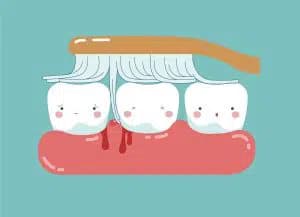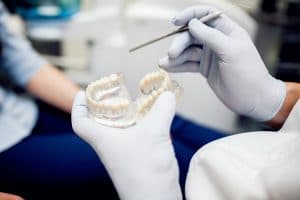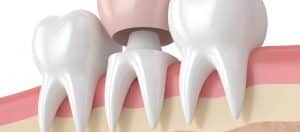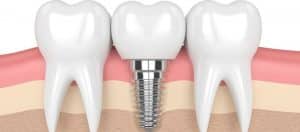Dentures Vs Implants
A healthy adult should have 32 teeth, including the four wisdom teeth that develop between the ages of 17-21. However, research has shown that most people have fewer teeth for various reasons. Age is an important factor in a person’s total number of teeth. Compared to youngsters, older people have fewer teeth.
Did you know that Australian adults are missing five teeth on average? A survey by NDIT 2013 revealed that 15.5 per cent of adults had severe teeth loss – fewer than 21 teeth. While people aged between 15 and 24 reported 1.8 missing teeth on average, people aged 65 and over experienced 10.8 missing teeth.
Teeth loss can happen due to various contributing factors, such as tooth decay, accidents, gum disease, and dental fractures. However, everyone wants a complete set of teeth or minimal teeth loss to enjoy their favourite foods and lead a quality life.
Since permanent teeth cannot regrow, the patients can only depend on dentistry solutions to regain their quality of life and confidence.
Do you need help with losing teeth and searching for options that can provide durable solutions?
Let’s discuss two popular dentistry solutions for missing teeth: dentures and dental implants. Knowing the dentures vs. implants pros and cons can help you to choose the most suitable treatment option according to your needs.

Dentures
Dentures are removable teeth replacements prepared in a dental laboratory. You can remove a denture from the mouth and put it back in. Two types of dentures are available for patients based on their needs: partial and complete dentures.
While complete dentures are the solution for people who have lost all their teeth, partial dentures fit the needs of people with some natural teeth left in their mouth.
Complete Dentures
Patients can choose either conventional or immediate dentures based on their requirements. A traditional, complete denture is ideal when all the teeth are removed, and the oral tissues have healed. The patients may struggle without teeth since healing and recovery takes a few months.
On the other hand, patients can receive complete dentures immediately after their teeth have been extracted. Dentists take patients’ gum and jaw measurements during the initial visit and prepare matching dentures. Though immediate dentures provide instant teeth after extraction, these dentures need to be relined after a few months of insertion.
Partial Dentures
Partial dentures come with a metal frame that attaches to the patient’s natural teeth to fix the dentures. These dentures are useful for patients with natural teeth that remain healthy in the lower or upper jaw. Apart from filling the space of the missing teeth, partial dentures prevent your natural teeth from changing position.
Dental Implants
Dental implants are metal screws or frames fixed into the jawbone for permanently mounting dentures or crowns. Dental surgeons perform minor surgery in the gums and jawbone to improve the implant. Note that these implants work like your teeth roots and offer durable solutions.
The implants fuse with the jawbones of the patients and provide stable support. It is a highly convenient teeth replacement option for people uncomfortable with removable dentures. However, people with adequate jawbone support can only choose dental implants.
Dentists offer two types of dental implants based on the implanting process: endosteal and subperiosteal.
Endosteal Implants
During the process, dentists surgically insert the implants into the jawbone. Once the jawbones and gums have fused with the implant, crowns or dentures mounted on the implant will work like natural teeth. Endosteal implants are the preferred tooth implant option for patients and dentists.
Subperiosteal Implants
Dentists fix a metal frame onto the jawbone, just below the gum tissue. Compared to endosteal implants, subperiosteal implants do not need deep jawbone drilling to fix the implant. Once the gum heals, dentists fix the artificial crowns on the implants.
Metal And Non-Metal Implants
Based on the material used, you can choose metal and non-metal implants. While metal implants are made from titanium, non-metal implants are prepared from zirconium.
Metal implants provide excellent durability. However, it may corrode and cause an allergy in some patients. Zirconium implants look like natural teeth because they are creamy white and do not cause corrosion or allergy issues.
Note that titanium implants can give consistent results for over 25 years. Compared to metal implants, zirconium implants are less durable.
Dentures vs Implants
Comparing the features and demerits of dentures and implants can help you choose the right teeth replacement option based on your needs.
Pros of Dentures
Removable dentures can reduce the quality of the jawbone and deteriorate the facial structure.It can look and feel unnatural
Cons of Dentures
- Often slip, move around, and cause discomfort.
- People can’t enjoy certain foods due to the reduced chewing capacity.
- It needs to be relined or remade at regular intervals.
- Need to remove for routine cleaning.
- Ill-fitted dentures may irritate gums and create sores in the mouth.
- Dentists often use adhesives to secure dentures, and it can make cleaning the dentures a challenging task.
Pros of Dental Implants
- Preserve the jawbone and keep the facial structure as is.
- Feel and work like natural teeth.
- It is securely fixed to the jaw and fits comfortably.
- Provide excellent chewing capacity, similar to original teeth.
- Long-lasting solution.
- Easy to clean and care for without removing.
- Implants fuse with jawbones and do not cause irritation or issues to the gums.
- Implants do not require any adhesives or chemicals and are directly fixed into the jawbone.
Cons of Dental Implants
- They have a higher price tag compared to dentures.
- The process involves multiple stages, including surgical procedures.
- Certain patients may need bone grafts before getting dental implants.
Compared to dentures, dental implants provide superior results and enhance the appearance of your face with a permanent solution. It also improves your speech without mumbling or slurring words and enhances your self-esteem.

Dentures vs. Implants Cost
While considering the dentures vs. implants cost, dentures are highly affordable. However, you have to buy fixatives, denture replacements, and cleaning solutions, which increases your expenses for the denture.
The removable dentures need to be replaced more frequently – every 7 to 15 years. On the other hand, dental implants can give consistent results beyond 25 years. Many patients consider implants a long-term investment and a permanent solution to their worries.
Since dental implants work like natural teeth and need only a one-time investment, they become the best option for teeth replacement.
Note that a few dental clinics in Melbourne offer affordable financing options and dental implant plans. They collaborate with premier payment and credit solution providers in the healthcare industry and provide customised programs based on your requirements. Do you know that some clinics in Melbourne provide plans that can offer $70,000 with up to a 7-year term?
Who Should Choose Dentures?
Though dental implants have numerous benefits, removable dentures become the only option for some patients. If you want a more affordable teeth replacement solution, dentures are the option for your needs.
Some people do not prefer invasive dental treatment options for various reasons, such as chronic medical conditions, dental anxiety, etc. They can choose dentures to replace their missing teeth.
Dental surgeons do not allow some patients who struggle with heart disease or diabetes to go for dental implants. Similarly, dentists often reject the dental implant procedure for heavy smokers and patients undergoing radiation therapy around the head or neck.
A few patients may need more jawbone density to fix the dental implants. Dental surgeons usually perform a bone grafting procedure to improve the bone density. In rare occasions, even the bone grafting cannot improve the bone density of jaws. Therefore, removable dentures become the only choice for such patients.
Who Should Choose Dental Implants?
This is a solution for people who want dental replacements that look and feel like natural teeth. Do you think that a removable denture may slide inside your mouth? Dental implants can give you fixed and permanent teeth.
It is the most recommended teeth replacement option for people who can undergo oral surgery and have sufficient jawbone density.
Do you want the shape of your jaw and face to be better protected? Without a tooth, the jawbone under it resorbs and melts away. It occurs due to there being no tooth in place to support. It can make your face look prematurely aged and your jaw vulnerable to fractures.
When dental implants fuse with your jawbone, the resorb process stops. It helps you to retain the shape of your jaws and face.
Maintenance of Dentures vs. Implants
When it comes to maintaining dental implants versus dentures, the approaches differ based on the type of tooth replacement.
Dental Implants
Looking after your dental implants is like practising regular dental hygiene for your natural teeth. This involves:
- • Brushing your dental implants at least twice daily using a soft-bristle brush, just like natural teeth.
- • Regularly flossing around your dental implants to ensure proper cleaning between the teeth and gums.
- • Scheduling routine dental checkups to monitor the health of your implants, gums, and oral condition.
Dentures
Dentures require more daily maintenance to ensure their long-term viability.
- Remove your dentures before sleeping to allow your gums to rest and promote oral health.
- Keep your dentures in water or a specialised cleaning solution overnight to clean them.
- After eating, remove your dentures and brush them to remove food particles and debris. Also, don’t forget to clean any adhesive residue from your gums.
Deciding on Dentures vs. Implants
When it’s time to choose between dentures and implants for your dental needs, consider these important factors:
1. Age
Consider your age when deciding between dentures and implants. Younger individuals might opt for implants as they offer a long-term solution, while dentures could be a more practical choice for older individuals.
2. Bone Density
Your bone density plays a crucial role. Dental implants require a certain amount of healthy jawbone for proper anchoring. Dentures might be a more feasible option if your bone density is inadequate.
3. Function and Feel
Think about how you want your replacement teeth to function and feel. Implants closely mimic natural teeth, allowing you to bite, chew, and speak comfortably. Dentures can sometimes feel less natural and impact certain functions.
4. Hygiene
Consider your commitment to oral hygiene. Implants are cared for similarly to natural teeth, involving regular brushing and flossing. Dentures, however, require specific cleaning routines, removal at night, and soaking.
These factors can guide your decision-making process, helping you choose between dentures and implants based on your unique needs and circumstances. Consulting with a dental professional will provide valuable insights tailored to your situation.
Final Thoughts
While dental implants can give long-lasting results, your care and dental hygiene play a major role in the lifespan of your implant. Following good dental hygienic practices can improve not only your oral health but your overall health as well.
Oral health issues like periodontal diseases can lead to chronic health conditions such as stroke, diabetes, heart disease, etc. Brush two times a day, floss once daily, quit smoking, and follow a balanced diet to ensure proper oral health.
Finally, go for regular dental checkups to ensure good oral health and get early signals of dental diseases. Prevention is better than cure.
Contact Us for Quality Dental Implants
Bay Street Dental Group specialises in dental implant services in Melbourne. We have years of experience in providing quality implants to clients of all ages. . You can book the dental implant services online or call us with your questions on (03) 9646 2577.












